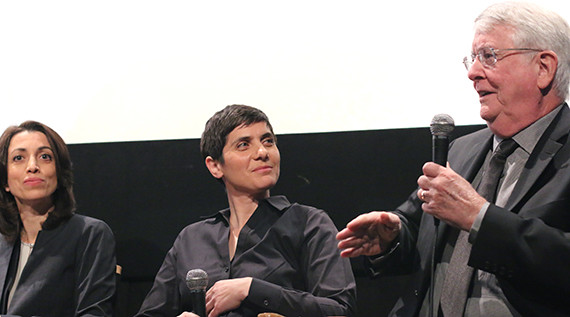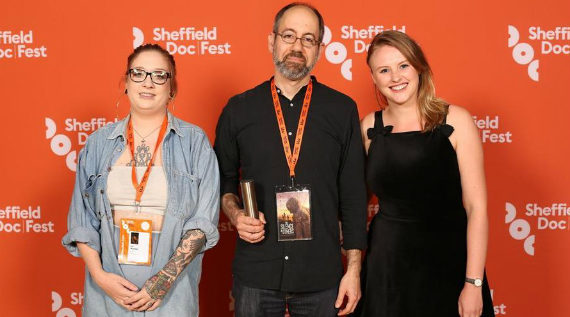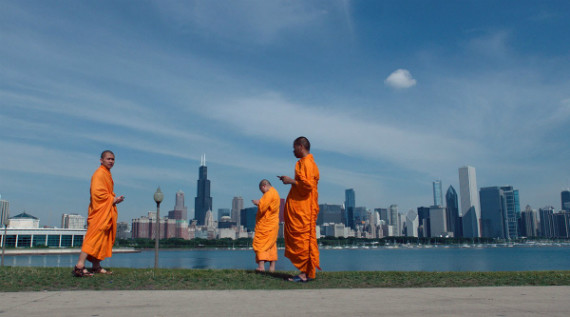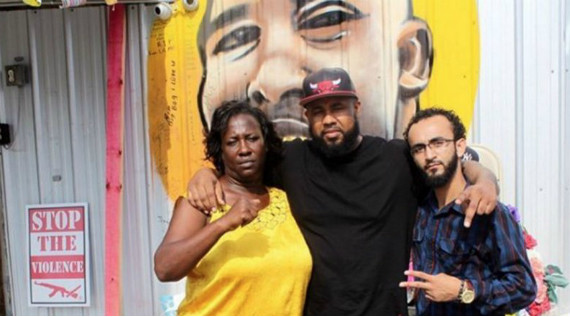We might as well dig right in with DOC NYC’s inaugural 40 Under 40 list, which intends to shine a light on 40 documentary talents under the age of 40 and includes familiar names like Khalik Allah, Sara Dosa, Garrett Bradley, and Nathan Truesdell. “Notable statistics from the list: 22 honorees are women, more than half are filmmakers of color, and the youngest person turns 28 in November. The final list was chosen by the DOC NYC team of Artistic Director Thom Powers, Director of Development Deborah Rudolph, Director of Programming Basil Tsiokos, and Shorts Programmer Opal H. Bennett.”
In case you haven’t noticed, we are now in the throes of award season and this past week saw two sets of nominations announced. The nominees for the the 28th Annual IFP Gotham Awards were unveiled on Thursday and BISBEE ’17, HALE COUNTY THIS MORNING, THIS EVENING, MINDING THE GAP, SHIRKERS and WON’T YOU BE MY NEIGHBOR? are each up for Best Documentary. Meanwhile, the nominees for the 3rd annual Critics’ Choice Documentary Awards are CRIME + PUNISHMENT, DARK MONEY, FREE SOLO, HAL, HITLER’S HOLLYWOOD, MINDING THE GAP, RBG, THREE IDENTICAL STRANGERS, WILD WILD COUNTRY, and WON’T YOU BE MY NEIGHBOR?.
We’ll be closing out our 2018 Fall Season of Stranger Than Fiction tomorrow night at the IFC Center with Chris Metzler, Jeff Springer and Quinn Costello’s RODENTS OF UNUSUAL SIZE, which will feature a live Q&A with co-director and cinematographer Jeff Springer himself. Tickets for our season closer are still available here.
Continue reading…
Many of this past week’s highlights are not necessarily exclusively doc related, but they are worth your attention none-the-less. In The Globe and Mail, Barry Hertz reported that “On Wednesday, Oscar-winning actress Brie Larson announced at the Women in Film Los Angeles Crystal + Lucy Awards that both TIFF and the Sundance Film Festival in Utah will allocate 20 per cent of their respective press credentials to underrepresented writers.” IndieWire’s Eric Kohn notes, “The announcement came just days after a report by the USC Annenberg Inclusion Initiative revealed that women wrote only 22.2 percent of 19,559 reviews of the 100 top-grossing films posted to Rotten Tomatoes.” Jenna Marotta further detailed the release, “The report found that 63.9 percent of those reviews were written by white men, versus white women (18.1 percent), underrepresented men (13.8 percent), and underrepresented women (4.1 percent).” Meanwhile at Mel Magazine, Jessica Ritchey took on this issue from a different angle with her incisive piece, “You’re Doing Women No Favors With Your Mocking ‘Ugh, Only Straight White Men Like This’ Takes.”
Maybe the most read pieces of the week came from Eric Allen Hatch, former programmer of the Maryland Film Festival, in which drops a weighty manifesto via Filmmaker Magazine on the future of arthouse programming a-la Steven Soderbergh’s 2013 “State of Cinema” address. “MOONLIGHT, GET OUT, and I AM NOT YOUR NEGRO were not ‘surprise hits,’ they were the triumphant first blast of what the next 25 years of moviegoing will look like. As the successes of these and other films cohere in the marketplace, tone-deaf gatekeepers’ stale assumptions of what art house films and audiences look like will no longer fly—not artistically, and not financially. The reactionary people who, over the past two decades, have tripped up visionary cinema’s path to the big screen with their own lack of vision are on their way out.”
Continue reading…
Undoubtedly, every return of Werner Herzog to the big screen is cause for celebration, so it’s unsurprising to find that with the release of his ominous cinematic inquiry into the future of the internet and robotics with LO AND BEHOLD: REVERIES OF THE CONNECTED WORLD has been met with a celebratory chorus of critical praise. The folks at both Film Comment and WNYC proclaimed it the film of the week, while critics like Keyframe’s Tina Hassannia, Notebook’s Duncan Gray and Co.Create’s Neal Ungerleider dug deep into Herzog’s latest existential interrogation, ultimately finding much to love. Other warm reviews came in from Marc Spitz in The New York Times, Robert Abele at The Los Angeles Times, the Washington Post’s Ann Hornaday and Emma Sandler of Forbes, who interestingly points out the fact that the project was originally intended as an advertising piece for Netscout before it reached Herzog’s inquisitive hands. Matt Zoller Seitz, though appreciative, was not as enthusiastic, writing at RogerEbert.com, “The film is saved from mere competence by that Herzogian feeling, at once grandiose and self-deprecating.”
At the Toronto International Film Festival, whom added a handful of notable new docs to their already stellar looking lineup this past week (Terrence Malick’s VOYAGE OF TIME, Gianfranco Rosi’s FIRE AT SEA, among others), Herzog is scheduled to drop a pair of new films, one fiction – SALT AND FIRE – and one non-fiction – INTO THE VOLCANO. Pat Mullen reported on the festival’s additions for POV Magazine, while Michael Nordine gave a brief preview of how Malick made his first venture into documentary filmmaking for IndieWire.
While TIFF continues to reveal more films, Kosovo’s DokuFest wrapped last week, naming OLEG AND HIS RARE ARTS by Andrés Duque the winner of its International Documentary Competition and DEPTH TWO by Ognjen Glavonic the winner of the Balkan Documentary Competition. The European Film Awards also named 15 films nominated for the documentary category, including Piotr Stasik’s 21 X NEW YORK, Fredrik & Magnus Gertten’s BECOMING ZLATAN, Pietro Marcello LOST AND BEAUTIFUL, and Sergei Loznitsa’s THE EVENT, which can currently be streamed for free via Doc Alliance.
Continue reading…
The line between art, politics and journalism are continually open to inquiry within the realm of documentary filmmaking. Those lines were valiantly breached last Wednesday at The Talkhouse when David Felix Sutcliffe, co-director of the remarkable and horrifying film (T)ERROR, posted an open letter to the doc community calling for the end of systematic targeting of citizen journalists who’ve documented disgraceful abuses of power by police. A formal statement composed by the International Documentary Association addressed to Department of Justice and signed by a considerable list of doc filmmakers that includes Laura Poitras, Barbara Kopple, Steve James, Joshua Oppenheimer, the entire Kartemquin team and many others, asks for the investigation of “other instances of police violence captured on video by citizens, and what consequences they may have faced” in an effort to “expand our awareness of the problem and take stock of the damages.” Whether filmmaker or concerned citizen, you can show your support for the #RightToRecord by adding your name to the petition here.
While not the central theme, a handful of activist films were among the lineup of the TIFF Docs program revealed this past week, including Steve James’ ABACUS: SMALL ENOUGH TO JAIL, Raoul Peck’s I AM NOT YOUR NEGRO, Fernando León de Aranoa’s POLITICS, INSTRUCTIONS MANUAL and Kief Davidson and Richard Ladkani’s THE IVORY GAME. At Indiewire, Anne Thompson took a tour through the lineup with our own Thom Powers, whom programmed the TIFF Docs program, while Kate Erbland reported on the initial announcement. Reflecting on Toronto’s A-list doc lineup, Tom Roston gave a first look of the offerings at Doc Soup, Steven Zeitchik did the same in The Los Angeles Times, and Kevin Ritchie followed suit at Realscreen. Noting the prominence of Netflix productions among the lineup, Matthew Jacobs gave the scoop on the four docs at Huffington Post, including Werner Herzog’s long in production volcano film, INTO THE INFERNO. And on the topic of the Bavarian filmmaker, Herzog showed up this week at The Daily Beast, offering his appreciative thoughts on Kanye West’s controversial FAMOUS music video.
The New York Film Festival also revealed their main slate, adding to their already intriguing doc lineup with Gianfranco Rosi’s Golden Berlin Bear winner FIRE AT SEA and revival screenings of Barbara Kopple’s Oscar winning HARLAN COUNTY, U.S.A. The latest edition of IndieWire’s Screen Talk podcast discusses the lineups of both TIFF and NYFF.
Continue reading…

Making a Murderer directors Laura Ricciardi and Moira Demos with Stephen Glynn, Steven Avery's lawyer.
© Jasmin Chang
“If we as a society are interested in protection, than we should be trying to get it right in justice.”
–Laura Ricciardi
Unless you have sworn off all forms of media, chances are you’re aware of the recent popularity of the true crime genre. After The Jinx and Serial, the latest series that’s taken true crime by storm is Netflix’s Making A Murderer.
On February 25, The Stranger Than Fiction documentary series presented The Making of MAKING A MURDERER, a one-of-a-kind event hosted by DOC NYC Artistic Director Thom Powers. Powers conducted a live 90-minute interview with Laura Ricciardi and Moira Demos, directors of the 10-episode Netflix documentary series MAKING A MURDERER, released in December 2015. The interview unpacked the production and editing of the ten year documentary process, and concluded with key takeaways of the series. Cinephiles had the opportunity to view selected clips from the series, and hear from the special guests of the evening: production advisor Maureen Ryan, editor Mary Manhardt, and Civil Rights lawyer Stephen Glynn.
Steven Avery of Manitowoc, Wisconsin was exonerated in 2003 for wrongful conviction after serving 18 years in prison. In an unprecedented boomerang turn of events, Avery was arrested in 2005, and in 2007, sentenced to life in prison for murder. MAKING A MURDERER documents the most controversial investigation Wisconsin has ever seen. On a grander scale, it shines a light on the cracks triggered by the rigidity of the United States justice system, reinforced by “an unwarranted certitude on the part of police officers and prosecutors and defense lawyers and judges and jurors that they’re getting it right, that they simply are right.” This comment was made by Avery’s lawyer Dean Strang in the series, and he emphasized the “tragic lack of humility of everyone who participates in our criminal justice system.” Consequently, STF’s The Making of MAKING A MURDERER unveiled a deeper examination of the United States justice system.
Continue reading…










